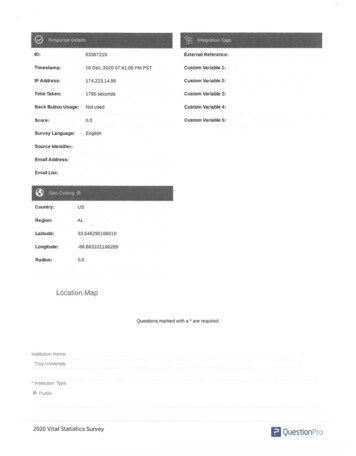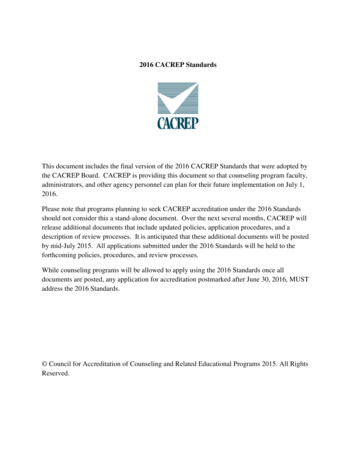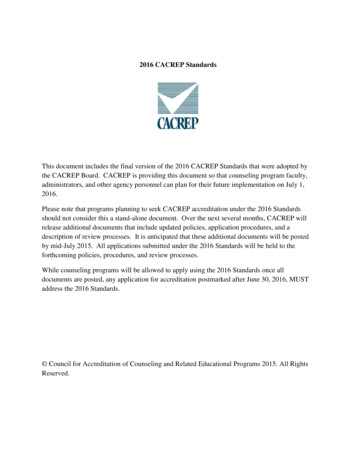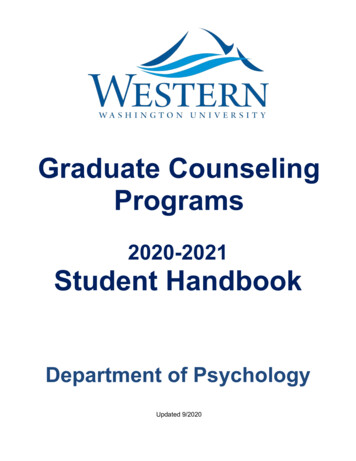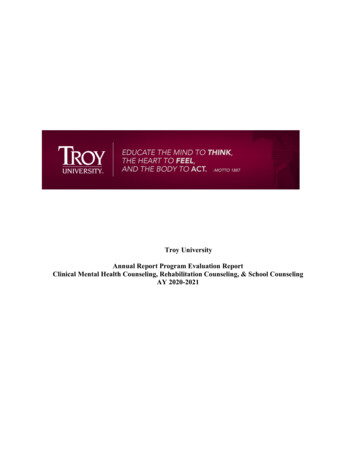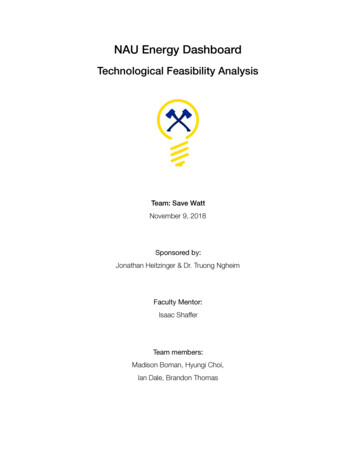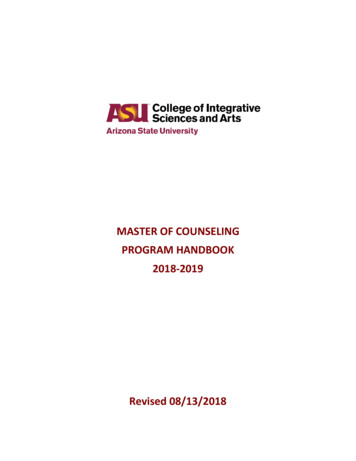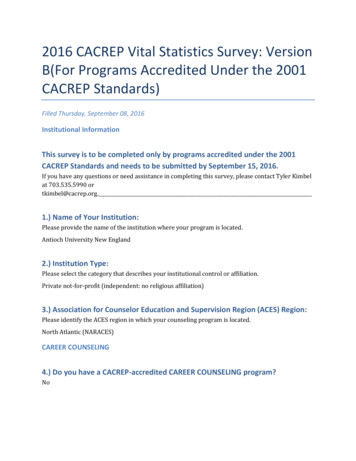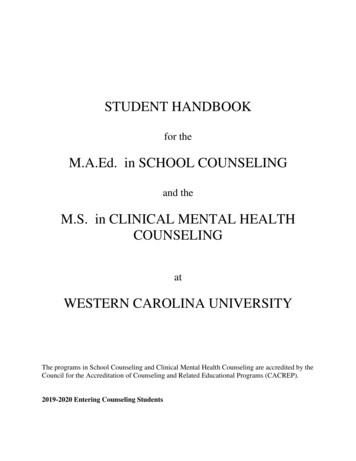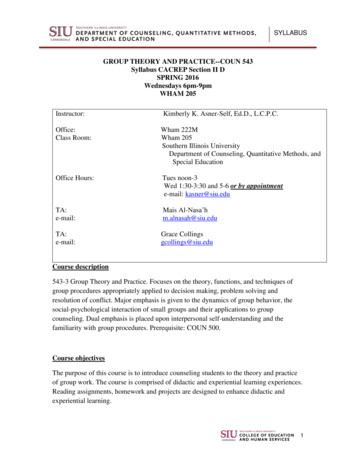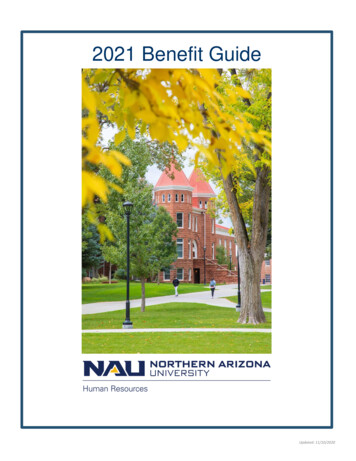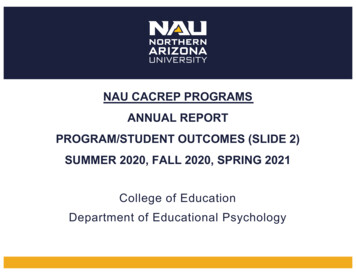
Transcription
NAU CACREP PROGRAMSANNUAL REPORTPROGRAM/STUDENT OUTCOMES (SLIDE 2)SUMMER 2020, FALL 2020, SPRING 2021College of EducationDepartment of Educational Psychology
PROGRAM/STUDENT OUTCOMES REPORT Number of graduates in the past year (Institutional Research data)– CMHC: 24– SC: 39Graduation Completion Rate - (Institutional Research data)– CMHC: 76% (3 yr completion rate; 97% 5-year comp. rate)– SC: 100% (3 year completion rate)Licensure or Certification pass rate– NCE results: 100% pass rate for past year– 100% of SC grads who sought P-12 Guidance Counselorcertificates were certified shortly after graduationJob Placement Rates (communication with grads, alumni surveys)–CMHC: 91%–SC: 100% job placement rates among graduates who2
PURPOSE OF THIS ANNUAL REPORT To maintain accreditation, the Council for the Accreditation ofCounseling and Related Educational Programs (CACREP) requiresthat programs undergo continuous, systematic evaluation of theprogram and its objectives (Section 4).CACREP also requires an annual report that:– Summarizes program evaluation results– Outlines program modifications– Identifies substantial program changesProvide highlights and data about our programs– Clinical Mental Health Counseling (CMHC)– Counseling – School Counseling (SC)Share the report with students, faculty, administration, andpersonnel in cooperating agencies3
Mission &Program Objectives4
OUR CACREP PROGRAM’S MISSION STATEMENTThe mission of the Council for the Accreditation ofCounseling and Related Educational Programs(CACREP) accredited master's programs is to prepareprofessional counselors who meet national standards ofthe National Board of Certified Counselors (NBCC) aswell as state counseling licensure or certification in theirspecialty area. Our programs are designed to becomprehensive in nature and to focus on thedevelopment of evidence-based counseling practice in avariety of settings and with clients from culturally diversebackgrounds.5
OUR CACREP PROGRAM’S OBJECTIVESNEWLY REVISED OBJECTIVES Implemented Fall 2020: Program and Student Learning Objectives for SchoolCounseling and Clinical Mental Health Counseling ProgramsProgrammatic Objectives:1. Our Clinical Mental Health and School Counseling Programs regularlygather and “reflect input from all persons involved in the conduct of theprogram, including counselor education program faculty, current and formerstudents, and personnel in cooperating agencies.”2. We seek to recruit and retain students who represent the diverse populationof the Southwestern U.S.6
OUR PROGRAM’S OBJECTIVES, CONTINUEDStudent Learning Objectives:Successful completion of the Master of Arts in Clinical Mental Health Counselingand the Master of Education in School Counseling prepares students to:1. Become familiar with the requirements for being a professional counselor,including the relevant research and literature pertinent to the discipline.2. Become familiar with and knowledgeable about the nature and needs ofindividuals at all developmental levels.3. Develop a thorough understanding of knowledge and competencies relatedto issues and trends in a multicultural and pluralistic society, and toeffectively demonstrate multicultural counseling competencies.4. Demonstrate effective counseling skills.5. Become familiar with studies in group dynamics and to development andrelated life factors, and to demonstrate effective career counseling skills.6. Understand major theories of career development and related life factors,and to demonstrate effective career counseling skills.7
OUR PROGRAM’S OBJECTIVES, CONTINUED7.8.9.10.11.12.13.14.Develop an understanding of assessment processes, and to demonstrate skills in individual andgroup approaches to assessment and evaluation.Become familiar with research, statistics, and program evaluation as they apply to the practice ofcounseling.Develop a clear sense of professional identity in counseling, which includes professional ethics,legal responsibilities, professional preparation standards, participating in professionalorganizations, and obtaining necessary credentials.Acquire knowledge about counseling supervision, and to experience peer, site supervisor andfaculty supervision that allow students to integrate and apply the knowledge and skills that theyhave acquired to practice.Experience continuous course-related and overall program-related feedback to enhance theirprofessional development as they become professional counselors.Acquire knowledge and skills related to the ways that counselors use a variety of technologiesdesigned to assist students, clients, and the systems they work within.Acquire knowledge related to the professional identity, roles, and functions of professionalcounselors.Practice ongoing assessment of one's own skills, strengths, weaknesses, professional andpersonal development as related to counseling professional identity, counseling ethics, and theprinciples of ethics of client autonomy, non-maleficence, beneficence, justice, and fidelity.8
Program History9
OUR CACREP PROGRAM’S HISTORY CACREP Accredited Since 1998– Community Counseling (now Clinical Mental Health Counseling)– School CounselingRe-accredited in 2006Re-accredited in 2014 – through March 2016Fully re-accredited in 2015 through 2022Next self-study due to CACREP in December 2020/Jan 2021Site visit during 2021– Seeking continued accreditation through March 2022Currently accredited under CACREP 2009 Standards– Moving actively toward CACREP 2016 StandardsOur Self-Study was sent to CACREP by 12/22/20– Goal: Re-accreditation for 2022- 2030– Site Visit – April 4-6, 202210
Current Programs:Degrees & LocationsCurriculaFaculty11
OUR CURRENT CACREP PROGRAMS MA Clinical Mental Health Counseling (60-credit hours)– Flagstaff Mountain Campus Annual admission each Fall– Phoenix, North Valley Campus Annual admission each Fall (as of Fall 2019)– Tucson Campus Alternate odd-year admission - Spring MEd Counseling – School Counseling (NOW 60-credit hours)– Flagstaff Mountain Campus Annual admission each Fall– Phoenix, North Valley Campus Annual admission each Fall (as of Fall 2019)– Tucson Campus Biannual admission12
OUR PROGRAM’S CURRICULA M.A. Clinical Mental Health Counseling (60-credit hours)––––Theoretical Foundations Lifespan Human Development: Implications for CounselingSocial / Cultural Foundations Multicultural CounselingResearch Introduction to Counseling Research (New course, became EPS 617 in Fall 2019)Counseling SpecializationsMeasurements Counseling Assessment (New course, became EPS 688 in Fall 2019)Counseling Mental Health Care Systems (new course as of Fall 2021) Foundations of Clinical Mental Health Counseling Marriage, Couple and Family Counseling Theories of Counseling Vocational Counseling and Career Development Counseling Processes Group Processes Crisis, Trauma, and Disaster Counseling Evidence-Based Counseling Techniques13
OUR CMHC PROGRAM’S CURRICULA, CONTINUED M.A. Clinical Mental Health Counseling, continued–Counseling SpecializationsProfessional Practices Substance-related and Addictive DisordersProfessional Ethics, Legal Standards, and ResponsibilitiesCounseling PracticumPsychopathology and DiagnosisMaster’s Counseling InternshipElectives Child and Adolescent Counseling Biological Bases of Behavior 1 credit course elective options began Fall 2018– Self-Care and Wellness for Counselors– Counseling & Spirituality– Independent Study, 1-credit only, approved by advisor14
OUR SC PROGRAM’S CURRICULA M.Ed. Coun. – School Counseling (now 60-credit hrs)–Development Lifespan Human Development: Implications for Counseling–Measurement Counseling Assessment (New course) Introduction to Counseling Research (New course, became EPS 617 inFall 2019)–Counseling Theories of CounselingVocational Counseling and Career DevelopmentCounseling ProcessesGroup ProcessesProfessional Ethics, Legal Standards, and ResponsibilitiesMulticultural CounselingCounseling PracticumMaster’s Counseling InternshipCrisis, Trauma and Disaster Counseling – School Counseling version15
OUR SC PROGRAM’S CURRICULA, CONTINUEDSchool Counseling Specialization– Foundations of School Counseling– Child and Adolescent Counseling– Practices of School CounselingNewly required courses (shifted from 48 to 60 credits)––––Marriage, Couple and Family CounselingSubstance-related and Addictive DisordersPsychopathology and DiagnosisElective options Evidence Based Counseling Techniques Survey of Special Education Applied Beh. Mgt School-Based Interventions Others by advisor’s consent16
OUR COUNSELING FACULTY Flagstaff Mountain Campus, Core Faculty:–Pit Kolodinsky, PhD MA Clinical Mental Health Program Coordinator– Sara Haas, PhD MEd Counseling-School Counseling Program Coordinator– Timothy Thomason, EdD– Shane Haberstroh, EdD Additional full-time Faculty–––Evie Garcia, PhD., Licensed PsychologistChesleigh Keene, PhD., PsychologistKim Kalas, EdD., Licensed Psychologist17
NAU CACREP CORE FACULTY, CONTINUED Phoenix, North Valley Campus– Steven Farmer, PhD MA Clinical Mental Health Program Coordinator– Sara Haas, PhD MEd Counseling-School Counseling Program Coordinator– Chad Snyder, PhD, CMHC and SC facultyTucson Campus– Saumya Arora, PhD MA Clinical Mental Health Program Coordinator– Sara Haas, PhD MEd Counseling-School Counseling Program CoordinatorWe also have numerous qualified non-core full-time and part-time faculty across thestate to assist in teaching in our programs and mentoring our students.18
Data Collection Methods &Analyses19
DATA COLLECTION PROCEDURESFOR THIS YEAR’S REPORT1.2.3.Completing our CACREP Self-Study by 12/22/21Complete CACREP’s “Vital Statistics” summary by December 2021Course Evaluation and KPI data collected each term compiled in ProgramEvaluation Report4. Online surveys of all Key Constituent Groups collected Fall 20215. Assessment and refinement of all CACREP standards from Sections I, II,III, & IV1. Core Faculty Ratios and FTE annually for each semester,Counselor Identity, Semester-by semester formal feedback to allstudents, etc.6. Program and curricular modifications discussed at:1. Monthly Counseling Committee meetings2. Monthly CACREP subcommittee meetings3. Bi-monthly CACREP Program Coordinator-Chair meetings20
OVERVIEW OF DATA FOR FALL 2020, SPRING 2021 &SUMMER 2021 ANNUAL REPORT (AY) Student Demographic data– Student demographics for both CMHC and SC program atNAU-Tucson, NAU-Phoenix and NAU-Flagstaff Data informing curricular changesProgram ModificationsPersonnel ChangesContinuous and Systematic EvaluationAnnual surveys of site supervisors and employers,alumni, and current students Survey of AZ School Districts21
DATA REVIEW AND ANALYSIS METHODSHow data is used for Curricular and Program Improvements During Counseling Committee and CACREPSubcommittee meetings, Program and Curricular dataare continuously reviewed and analyzed.Refinements and revisions are implemented (once votedin) on an on-going basis. Examples:–––Review of KPI dataData collected from course evaluations, constituentgroupsProfessional Disposition Evaluations completed eachsemester on each student22
STUDENT ASSESSMENT DATA Aggregate student assessment data that addressstudent knowledge, skills, and professional dispositions–Knowledge measured by grading of all assignments inall required classes (tests, projects rubrics, etc.)– Rubrics from skills-based Courses, for example: Counseling Processes (micro-skills rubrics), GroupProcesses (leadership rubrics) Supervisor Evaluations in Practicum, Internship, etc.– Professional Dispositions measured with regularsemester Professional Dispositions Evaluations Personal, Academic, Professional dispositions23
EVALUATION OF FACULTY AND SUPERVISORS Students have regular, systematic opportunities toformally evaluate counselor education program faculty. All Counselor Education Program faculty (including part-timeinstructors) are formally evaluated via Course Evaluations eachsemester (reviewed by Faculty Status Committee, Chair, andDean) Written procedures for administering the process forstudent evaluations of faculty are available to thecounselor education program faculty. All students in all courses are prompted multiple times duringthe last few weeks of each semester to complete formal CourseEvaluations of faculty via NAU email notifications as well as viaBlack Board Learn shell promptsEvaluation data reviewed regularly each semester24
EVALUATION OF FACULTY AND SUPERVISORS, CONTINUED Students have regular, systematic opportunities toformally evaluate practicum and internship supervisors. Practicum supervisors are formally evaluated via CourseEvaluations which are reviewed by Faculty StatusCommittee, the Chair and the COE Dean each semesterand formalized annuallyInternship site supervisors are formally evaluated at themid-point and at the end of internship via a qualtricsevaluation linkGroup supervision (and overall internship experience) isprovided by NAU faculty who are also reviewed formally atthe mid-point and the end of internship via a qualtricsevaluation link25
RECRUITMENT AND MARKETING EFFORTS Working with NAU Graduate College on these initiatives:– Continue expanding open houses, includingweekly open-houses conducted via Zoom orphone– Continue monthly prospective student visits– Ad hoc student prospective visits are ongoing– Redesigned website with updates: Faculty research highlighted Advocacy projects highlighted26
Recent Events&Program Modifications27
RECENT EVENTS & HIGHLIGHTS:CACREP ASSESSMENT PLAN HIGHLIGHTS Assessment Plan assesses Program Objectives, KPI’s, and allCACREP curricular standards in highly integrated fashion– Collecting Key Performance Indicators (KPIs) for all 8 CACREP corecurricular domains, and from Specialty areas (School and ClinicalMental Health Counseling) Sample of two KPI’s:– Self-Care KPI: developed and assessed in first semester(orientation courses), assessed again in Crises courses, andevaluated externally by Internship Supervisor ratings– Counseling Skills KPI: Detailed Summative Skills rubrics taughtand assessed in EPS 660, measured again via Practicumsupervisor, and finally by Internship Supervisor Faculty collect and evaluate Assessment Plan data eachsemester, and use data for program modifications as needed28
SNAPSHOT OF CACREP ASSESSMENT PLAN29
RECENT EVENTS AND HIGHLIGHTS, CONTINUED NAU Beta Alpha chapter of Chi Sigma Iota (NationalHonor Society for Counseling students) at Flagstaffcampus–Very active in 2020-2021: Multiple presentations for CSI students and localtherapists Multiple Service projects Fundraisers Social events30
PROGRAM MODIFICATIONS Application Change– Updated our application essay questions and scoringsystem to reflect social justice and diversity values Admissions Changes– GRE NO LONGER REQUIRED (except for GPAs 3.0)– Modified/enhanced Interview Day for all MA CMHC andMEd SC Candidates (piloted successfully in spring2017, installed permanently in Spring 2018) Revised Applicant Scoring process– Tucson campus has moved to Annualized Admission31
PROGRAM MODIFICATIONS Curricular modifications:–Revised Programs of Study during Spring 2020 New courses became official in both programs (in Fall 2019):–– EPS 688 Counseling AssessmentEPS 617 Counseling ResearchNew requirements:––––School-based Crisis course now required for SchoolCounseling (Statistics has now moved to program pre-req.)Intro to Stats now a SC program pre-requisiteEPS 621 now required, with new title: ”CounselingMarriages, Couples and Families”Revised electives in CMHC MA program:»»Counselor Self-Care and WellnessCounseling & Spirituality32
PROGRAM MODIFICATIONS, CONTINUED Faculty Changes:– Dr. Sara Haas begins as Program Coordinator of School Counselingprogram in Flagstaff in Jan. 2022, remains interim PC for SC programs inTucson and Phoenix.– Dr. Chad Snyder hired in Fall 2019 as new Core faculty member in Phx– Dr. Shane Haberstroh hired in Fall 2018 as new Core faculty member inFlagstaff– Dr. Chesleigh Keene, Psychologist, joined our full-time faculty Fall 2020Counseling Program is officially approved for the following new CACREP Core facultyand staff positions beginning in Fall 2022:– 1 Asst Clinical Professor in Flagstaff campus– 2 Asst Clinical Professor in Phoenix campus– 1 Asst Clinical Professor in Tucson campus– 1 Asst Clinical Professor in Yuma campus (pending program approval)– 1 full-time Practicum Program Coordinator (across all campuses)– 1 part-time administrative assistant specifically serving CACREP programs33
PROGRAM MODIFICATIONS, CONTINUED Programs now have “dual-career” flexibility– Graduates completing the 60-credit School Counseling degreeprogram are now eligible to apply for an LAC under the AZ BBHE– Graduates completing the 60-credit CMH Counseling degreeprogram are now eligible to apply for an AZ Certificate as aGuidance Counselor (need to add 2 SC courses within 3 years ofearning certificate).34
PROGRAM MODIFICATIONS, CONTINUED Technological updates:– VALT digital session recording system in Practicum Lab in Flagstaffand Tucson, being integrated into Phx Lab in 2021 as well– Purchased TheraVue for implementation in Spring 2021. 100 licensesfor 2021. TheraVue allows students to record themselves practicing awide variety of counseling microskills for self-evaluation andevaluation by faculty Suicidal assessment responsesCrisis responsesHandling difficult conversationsAdvanced empathyConfrontation– All evaluations for Practicum and Internship moved to an online formatand items edited to match desired measurement for CACREP standardsand Key Performance Indicators – continuous revisions35
EVER-EXPANDING INTERNSHIP PARTNERSHIPS Over 15 new Internship sites developed between Summer2020 and Fall 2021, including several in greater Phoenix,and new sites in other states as well. Affiliation Agreements required between Schools orAgencies and NAU36
CONTINUOUS AND SYSTEMATIC EVALUATION Data routinely gathered from variety of sources each semester:– Practicum Evaluations from site/lab supervisors– Internship Evaluations from site supervisors– Each student evaluated each semester by consensus offaculty: “Professional Disposition Evaluation” process– Course evaluations analyzed by peer faculty, Chair, andDean– Core Faculty ratios analyzed each semester– Alumni Surveys– Site Supervisor/Employer surveys37
CONTINUOUS AND SYSTEMATIC EVALUATION, CONTINUED CACREP standards have been selected from each of the 8 coreareas and each specialty (CMHC and School Counseling) Key Performance Indicators have been developed to measurelearning outcomes for each of these standards at different pointsthroughout the program. Syllabi containing the KPI’s have been finalized and shared withall faculty with instructions on how to capture KPI outcome data. Each course has a designated Course Lead as of Fall 2018 inorder to carefully monitor standards and KPI data collection Outcome data are being aggregated and maintained in Qualtricsand Blackboard. Faculty are reviewing data, identifying areas forgrowth and implementing changes for program improvement.– Practicum and Internship KPI data collected via Qualtrics– All other course-level KPI data are being collected via Bb Learn38
# OF GRADS IN PAST YEAR,COMPLETION RATE,LICENSURE OR CERTIFICATIONEXAMINATION PASS RATE, ANDJOB PLACEMENT RATE OFSTUDENTS/GRADUATES.39
OUR COUNSELING STUDENTS & RECENT GRADUATESFLAGSTAFF, PHOENIX, AND TUCSON Summer 2020 – Spring 2021– 174 Active Students 124 (71%) MA Clinical Mental Health Counseling 50 (29%) MEd Counseling-School Counseling– 63 Degrees Awarded 24 MA Clinical Mental Health Counseling 39 MEd Counseling-School Counseling40
OUR STUDENTS, CONTINUED Gender– 134 Female (52%)– 126 Male (48%)Ethnicity– 12 (5%) African American– 5 (2%) American Indian/Native Alaskan– 2 (1%) Asian-American– 159 (61%) Caucasian/White– 58 (22%) Hispanic/Latino/Spanish American– 15 (6%) Multiracial– 5 (2%) Other/UndisclosedIdentified Disability– 0 (0%)41
JOB REPLACEMENT RATES (BASED ON N 28 RESPONDENTS)SUMMER 2020, FALL 2020, SPRING 2021Of 29 respondents: 75% (21/28) secured a counseling position in their respectivespecialty area: 16 CMHC jobs, 5 SC jobs 11% (3/28) unsuccessful in finding a counseling position in theirrespective specialty area 14% (4/28) not looking for a counseling job 1 Entered a PhD program 3 Other42
RESULTS FROMONLINE SURVEYSSUMMER 2020, FALL 2020,SPRING 2021
Data from Current Interns and RecentGraduates44
CURRENT INTERNS AND RECENT GRADUATES’SURVEY RESULTS (SURVEYED FALL 2021) All current interns and recent graduates were emailedsurvey N 39 total respondents Questions:– Quantitative questions: Multiple Likert scale items– Qualitative data: Strengths of program Least beneficial elements of program Suggestions
Q5 - Please indicate your status with regard to your NAUCounseling program:#Answer%Count1Graduated Fall 202023%92Graduated Spring 2021 10%43Graduated Summer20213%14Graduated Mid-Fall202110%45Current Intern46%186Other8%3Total100%39
Q6 - NAU Campus you are/were enrolled n15%6Total100%39
Q7 - Please describe the format of your NAU degree:#Answer%Count1All in-person31%122Mostly in-person, withthe rest online orhybrid54%213About half in-person,and half online orhybrid2.5%14Mostly online orhybrid, with the restbeing in-person5%25All online or hybrid2.5%16Other5%2Total100%39
Q9 - Which of the following best represented your status while ingrad school?#Answer%Count1Full-time grad studentwith no outsideemployment23%92Full-time grad studentwith about 20 hours or soof employment (includingworking as a GA, etc)41%163Full-time grad studentwith less than 20 hoursper week of employment8%34Half-time grad student,full-time employment(30-40 hours/wk)5%25Half-time grad student,half-time employment(approx 20 hours/wk)3%16Other20%8Total100%39
Q11 - How effective has your Advisor been in providing relevantadvisement in order to matriculate through the program successfully?#Answer%Count1Extremely effective54%212Mostly effective26%103Moderately effective10%44Slightly effective2.5%15Not effective at all2.5%16Other5%2Total100%39
Q13 - I experienced part-time faculty as effective instructors#Answer%Count1Strongly agree36%142Agree36%143Neither agree nordisagree20%84Disagree5%25Strongly disagree3%1Total100%39
ALUMNI COMMENTS ABOUT NAUS COUNSELINGPROGRAMS’ STRENGTHS Summary of Strengths: All classes valuable to career Multicultural, Foundations & Practicum courses stand out Highly Experienced Faculty Experiential Learning Approach Cohort Experience Direct Quotes: “I can say with complete certainty that every class has been valuable to my professionalcareer.”“I got along with my cohort. We came from a diverse background, but had a common goal inhelping others.”“Strengths of the program include the multicultural class and evidence based treatment class.The peer-to-peer practice session performed prior to practicum were extremely beneficial.”“The initial orientation class with Kolodinsky, Trauma and Crisis and groups with Haberstroh,and ethics with Garcia were the 4 most effective core classes. My self compassion class withAndrea Meronuck was transformational and changed the trajectory of my life.”“Professors cared about their students. Great resources available for learning. Overallpositive experience.”“Experiential practice was the most valuable part of my program.”
ALUMNI COMMENTS ABOUT NAUS COUNSELING PROGRAMS’LEAST BENEFICIAL EXPERIENCES Summary of Areas for Growth: Specific Areas to Learn More: Business of Counseling Suicide risk & assessment More Support from Faculty in: Practicum & Internship placement Advisement NCE preparation Intensity of Course Load Direct Quotes: “To provide more guidance related to the NCE and ways in which to prepare for it given that itis a high-stakes exam.”“I think faculty, students, and the program could benefit from it being restructured to being 3years. It would most likely minimize stress and overwhelm on both students AND faculty.”
WHAT ARE OUR SCHOOLCOUNSELING SITESUPERVISORS ANDEMPLOYERS ARE SAYINGABOUT OUR INTERNS ANDGRADUATES?
SC SITE SUPERVISORS’ PROGRAM EVAL RATINGS 100% of School Counseling Site Supervisors Agree that:– NAU faculty oriented me to the SC internship successfully– NAU's interns are generally well- prepared to begin internship 90% of School Counseling Site Supervisors Agree that:– NAU faculty were available for consultation if/when needed– I found the online mid-term and final evaluation surveys easy to use– Expectations about my role as site supervisor were made clear tome– My intern(s) seem to have a solid foundation in the ASCA Model– Overall, I am impressed with NAU's CMHC internship processes
SC SITE SUPERVISORS’ PROGRAM EVALSUGGESTIONS/IMPROVEMENTSSummary: there was only One suggestion provided by School Counselingsupervisors. The issue of the MidTerm and Final Evals has since been resolved
WHAT ARE OUR CLINICALMENTAL HEALTHCOUNSELING SITESUPERVISORS ANDEMPLOYERS ARE SAYINGABOUT OUR INTERNS ANDGRADUATES?
CMHC SITE SUPERVISORS’ PROGRAM EVAL RATINGS 100% of School Counseling Site Supervisors Agree that:––––NAU faculty oriented me to the CMHC internship successfullyNAU's interns are generally well- prepared to begin internshipI found the online mid-term and final evaluation surveys easy to useExpectations about my role as site supervisor were made clear tome– Overall, I am impressed with NAU's CMHC internship processes 90% of School Counseling Site Supervisors Agree that:– NAU faculty were available for consultation if/when needed– NAU's interns are generally well- prepared to begin internship
CMHC SITE SUPERVISORS’ PROGRAM EVALSUGGESTIONS/IMPROVEMENTS
CMHC SUPERVISORS’ PERCEPTION OFPROGRAM “STRENGTHS”
INTERNAL PERCEPTIONS OF:STRENGTHSCHALLENGESINTENTIONS61
OUR INTERNAL PERCEPTIONS OF OUR STRENGTHS Perceived Strengths of programs––––––––Experienced new faculty with strong evaluationsFully-accredited via CACREP for almost 20 yearsSite supervisors consistently satisfied w interns/gradsMost grads are employed in their fields of study shortlyafter graduatingMost grads were satisfied with most elements oftraining, including relevance/utility of courseworkCourses routinely upgradedTechnology upgrades in practicum labs TherapyNotes EMR, TheraVue, VALT, etc Exceptionally high NCE pass rate62
OUR INTERNAL PERCEPTIONS OF OUR CHALLENGES Overcoming effects of pandemic on budget, including loss of 2 facultyrelated to budget cuts– Continuing to maintain sufficient core fac. to meet needsCompetition from large, online programs with massive marketingbudgets and continuous enrollmentMarketing more strategically for School Counseling and CMHCprogramsRecruiting and Enrolling % of Latinx students who match AZ HSgraduation rates more closelyCompetition: AZ BBHE Rules changes have made it easier forgraduates of unaccredited programs to get licensedTraining process for P/T instructors to be formalizedSocial media needs to be enhancedMore fieldwork experiences earlier in programIntegrating TeleHealth into training curricula for prac, internship63
THINKING AHEAD TO THE FUTURE Sample of PROGRAMMATIC INTENTIONS:– Considering adding an “integrated BH care focus”to the CMHC degree, or, at least an emphasisoption– Will begin teaching Mental Health Care Systems(with integrated BH and private practicedevelopment emphases)– Aiming for new cohort specifically designed forNative American cities in N/E Az.– More formal microskill “drilling” with TheraVue– Continued Electronic Documentation in Practicum– Enhance interview process for all applicants64
- Moving actively toward CACREP 2016 Standards Our Self-Study was sent to CACREP by 12/22/20 - Goal: Re-accreditation for 2022-2030 - Site Visit -April 4-6, 2022. Current Programs: . Assessment and refinement of all CACREP standards from Sections I, II, III, & IV 1. Core Faculty Ratios and FTE annually for each semester,
